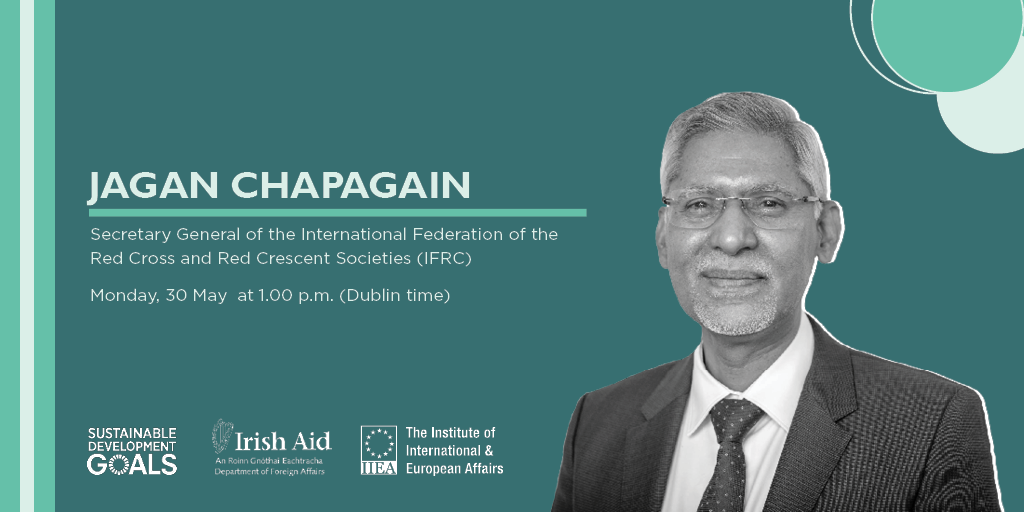Principled Humanitarian Action in Complex Humanitarian Emergencies

In the second lecture of the 2022 Development Matters series, supported by Irish Aid, the IIEA hosted Jagan Chapagain, Secretary General of the International Federation of Red Cross and Red Crescent Societies (IFRC). In his presentation, Mr Chapagain highlighted the current convergence of diverse crises that are changing the fabric of society, and which require principled humanitarian action. He reflected on the opportunities to strengthen humanitarian action and assessed how communities, governments and humanitarian actors can work together to build a better future. The event was chaired by David Donoghue, former Irish Ambassador to the UN.
In opening remarks, Robert Meade, Deputy Director of the Humanitarian Unit in Irish Aid emphasised the timeliness of Mr Chapagain’s visit to Ireland, given the number of rapidly evolving crises in the global humanitarian landscape. He highlighted how the complexity of humanitarian challenges is compounded by food insecurity, conflict, famine and increased natural disasters in both unfolding and protracted emergency settings. Mr Meade also acknowledged the value of the longstanding partnership between Ireland and the IFRC and stated that the fundamental principles of humanitarian work inform Ireland’s humanitarian action, from funding to programmes.
Pre-Pandemic State of Play
Mr Chapagain began his intervention by recalling the global situation prior to the outbreak of COVID-19. In one world, he said, people were living in the best time in history, enjoying the longest life expectancy, and the highest advancements in healthcare and technology. However, in another world, there was abject poverty and suffering, with some seven hundred million people living on less than two US dollars a day, one billion people living in slums, and a child dying every six seconds from preventable diseases. Mr Chapagain lamented the fact that these figures are expected to deteriorate in the near future. He emphasised that the stark contrast in living conditions experienced around the world revealed a deeply rooted inequality which increased exponentially following the onset of the pandemic.
Three C’s- Climate, Covid, Conflict
In his address, Mr Chapagain outlined the three major crises which the world is facing today, and dubbed them the three C’s : Climate Change, COVID-19 and Conflict. He identified the climate crisis as the most serious crisis facing humanity, not only due to the increase in natural disasters and extreme weather events but also due to the knock-on effect it has on food, food production and energy.
He reflected on how inequality in the world was exacerbated by COVID-19, with countries in the West emerging from the pandemic with high vaccine take-up and a return to pre-pandemic lifestyles, compared to the lasting negative impact seen in the developing world.
On conflict, Mr Chapagain focused attention to the ongoing conflicts in Afghanistan, Syria, Yemen, and the Sahel region, and highlighted that while there are a number of active conflicts across the world, conversation in Europe centres around the war in Ukraine. The combination of the three C’s is exacerbating, what Mr Chapagain referred to as, the five D’s: disasters, diseases, displacement, disparity, and discrimination. Lessening the impact of the three C’s on the five D’s, he added, is crucial for the maintenance of global peace and security.
Humanitarian Response
Mr Chapagain outlined three ways in which the humanitarian community can respond to these challenges.
- First, he emphasised the need to listen to and learn from those who are most affected by the crises.
- Second, he highlighted the need for less restrictive funding streams and smart financing of humanitarian work which benefits communities and makes programmes more effective. The inclusion of private sector donors, he argued, would balance the prominence of traditional donors. He recalled the support which the IFRC received from the sector during the pandemic, adding that the IFRC want to be active partners with the private sector in creating solutions and engaging on development.
- Third, he advocated for stronger leadership and invited the audience to imagine a new image of leadership for today’s globalised world, where leaders would be humble and inclusive.
Conclusion
Mr Chapagain engaged in a Q&A session, where he touched on the lasting impact of the conflict in Ukraine on Africa and its looming food crisis and on the work and programmes of the IFRC through the seven fundamental principles of humanitarian action; he highlighted the importance of giving a voice to local actors in humanitarian situations.
Mr Chapagain’s address offered a sobering analysis of inequality in today’s world while also providing pragmatic solutions well within the remit not only of humanitarian organisations, but also governments and the private sector.
